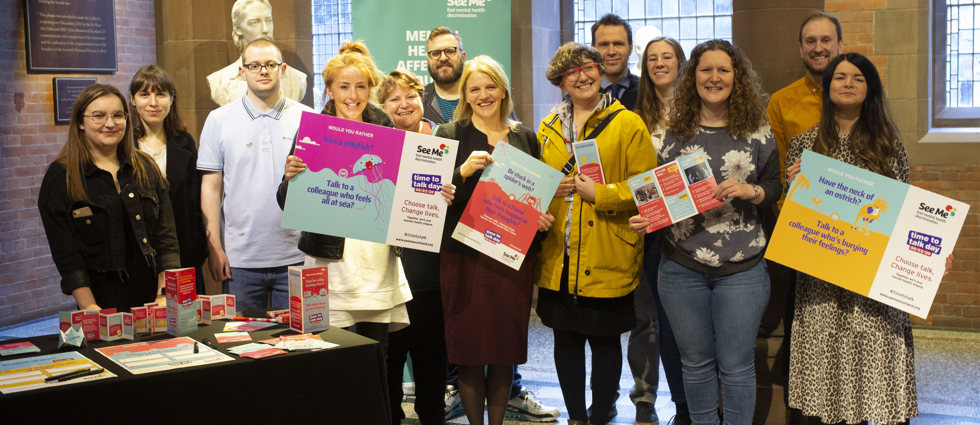Our Latest News
Beating burnout crucial to stop over half of HR professionals quitting
Beating burnout crucial to stop over half of HR professionals quitting
HR, payroll, and finance expert MHR has recently released its predictions for the top trends for HR professionals in 2024, with addressing burnout the most pressing priority on the agenda.
Shockingly, it reveals that half (50%) of HR professionals are on the verge of quitting thanks to burnout. Organisations will have to either prepare for a sudden massive talent deficit, or consider investing in ways to combat this urgently in 2024.
 The increase in reported burnout is likely due to the emotional load presented by the role of HR, which is likely to increase through 2024 given constant changes to employment law and increased employee expectations. Remote work has also compounded the issue, with teams feeling disconnected and bereft of a support network.
The increase in reported burnout is likely due to the emotional load presented by the role of HR, which is likely to increase through 2024 given constant changes to employment law and increased employee expectations. Remote work has also compounded the issue, with teams feeling disconnected and bereft of a support network.
Automating key processes can provide a solution to HR burnout. Coming into 2024, more organisations will embrace digital transformation, and HR departments will need to work closely with other departments to understand how AI can improve business functions, and how it can serve as a supplemental tool, rather than a talent replacement.
However, AI needs to be especially monitored for instances of bias, particularly in recruitment. In order to mitigate this, HR teams should work alongside Chief Technology Officers to regularly analyse and test AI-driven HR processes, and continuously improve AI models based on feedback, ensuring ethical and fair AI use in HR through the New Year.
With the continued implementation of AI and automation in the workplace in 2024, HR professionals will also need to ensure that employees have the correct skill sets, as shifting technologies mean that role requirements will look different year to year.
The research reveals that skillsets for jobs have already changed by 25% since 2015, and by 2027, this number is expected to double. As a result, candidates who can pick up new skills and adapt to change will be in high demand for 2024.
Likewise, up-skilling existing employees will be a focus for 2024. With 80% of the workforce no longer sitting behind desks to do their jobs according to the report, HR professionals cannot keep relying on traditional ‘office-based’ learning approaches to create an up-skilling culture. Instead, HR professionals will need to re-examine talent management strategies, and ensure that these align with learning resources offered.
Anton Roe, CEO at MHR, said: “AI was a stand-out theme for 2023 and it looks as though it is here to stay. As the adoption of AI becomes more widespread among businesses, HR leaders will need to review their processes to ensure it is a central theme of company strategy moving forward.
“Particular emphasis should be placed on reducing repetitive workload, improving data analysis and decision support. These are the areas that help to reduce workloads across HR organisations, reducing the risk of employee burnout as a result.”
Time To Talk: Accessing FREE tools and resources to support employee wellbeing
Time To Talk: Accessing FREE tools and resources to support employee wellbeing

Employee wellbeing is a key priority for businesses and HR teams across Scotland – but we know that employees continue to face barriers when it comes to opening up about their mental health. It’s on employers to create the conditions to support those conversations, and tackle the stigma that still exists.
See Me, Scotland’s programme to end mental health stigma and discrimination, has a wide range of free-to-access tools and resources to help make that change.
Boost your understanding
Engaging in development opportunities is an important part of anyone’s working life, and See Me’s programme of free webinars and learning events is worth checking out. Upcoming events include a session on using the popular Time to Talk Day campaign in your workplace to open up conversations, and a session on mental health inclusion in the workplace for leaders.
Taking stock
See Me’s self-assessment toolkit provides a framework that enables you to take stock of your organisation’s efforts around mental health, and what you’re doing to take action against mental health stigma and discrimination.
Raising awareness
The free e-Learning is a great addition to any organisation’s staff training offer. The web-based course offers insight into what mental health stigma and discrimination look like in the workplace. Using dramas and real life experiences, you’ll learn more about rights and good practice at every stage of employee working life: recruitment, in work and return to work.
Supporting conversations
The Let’s Chat tool is a must-read for line managers, offering advice on preparing for and having supportive conversations around mental health.
A whole-organisation approach
Employee wellbeing should be high on every employer’s agenda. If you are already on it and you want to make even more of a commitment to continuous improvement, See Me’s See Me in Work portal is for you. The free-to-access web tool takes you through a four-stage process, identifying what you’re doing well and what needs improvement, before offering ideas for action you can take going forward.
Whether you’re looking to start small or make longer-lasting change in your organisation, you can access even more tools, resources and inspiration over on the See Me website – seemescotland.org/workplace
BLOG: Do you feel like an Imposter at work?
Do you feel like an Imposter at work?
In this latest BLOG, founder of Xsector Mentor Andrew Penker and executive coach David Brown explore the Imposter phenomenon.
So what is Imposter Syndrome?
- feeling like a fraud, despite your achievements
- self-doubt, perfectionism, or fear of failure
- discounting your successes and struggling to accept praise, or
- working excessively hard to prove yourself

Originally described ‘the imposter phenomenon’ by Dr Pauline Clance and Dr Suzanne Imes, two clinical psychologists in 1978, their studies related to female professionals who ‘did not experience an internal sense of success’ and considered themselves ‘imposters’ at work.
This led to the result of their research being a condition in which people believe they are not worthy of success and have a persistent belief in their lack of competence. It meant that people who were achieving success had intense feelings that these achievements were undeserved, and were more to do with mistake or luck, than performance.
Being ‘Found out’
These feelings are often invisible to others and can affect jobs, relationships, and friendships. It can range from occasional worries to fears of being ‘found out,’ and can cause self-doubt, fear, and shame, making it hard to enjoy personal and professional living.
Label
For many, the label can be off-putting and be dismissed as invalid but if it were reframed to whether an individual has ever felt ‘inadequate’ at work, would these feelings be more readily recognised and accepted?
You may experience any or all of these, and others too:
- walking into a room full of senior people and feeling a sense of intimidation
- being overly hard on yourself for missing out something from the presentation you gave the other day (even though there’s no evidence of any negative reaction)
- not having the faintest idea where to start when given a project or piece of work that you’ve never tackled before
- you find yourself second-guessing your answers to the questions that people ask you.
Impact
The impact on behaviours, and how people feel emotionally and physically, can largely be negative. The positive side is that it can provide motivation and drive for people to achieve and exceed, however the negative aspects of overwork, self-criticism, and self-doubt are toxic and lead to feeling inadequate.
Often, during times of transition or change, or when people are faced with new challenges, can exacerbate these feelings.
What to do?
Moving from the familiarity of what is known and experienced can be daunting in itself but letting go and establishing a shift in mindset and approach can be achieved.
An Executive coach or Mentor can help provide time and space and psychological safety in exploring how to make this change. They are professionals who are trained to structure conversations that can lead to behavioural change and different outcomes, and can often take only a few sessions as well as a more sustained supportive challenge to get people to where they aspire to be.
Next Steps
We are interested in hearing more about how professionals are dealing with these feelings and whether through the sharing of their experiences and ways they have addressed these feelings, there are learnings for others who wish to do the same.
To start, we want to simply raise a level of awareness and encourage people to start having a conversation about it, either with peers, or with their managers and leaders. Only by surfacing it, will we be able to begin tackling it.
In the rest of this series we plan to scratch below the surface, and look at how coaching and mentoring could enable ways to recognise and deal with these feelings.
But for now, let’s just start the conversation.
Less than 4% of young people use ethnic or racial labels
Less than 4% of young people use ethnic or racial labels
When describing friendship cliques in their school, less than 4% of young people use ethnic or racial labels, reveals new research by the University of Cologne. The study, conducted by Clemens Kroneberg, Professor of Sociology at the Institute of Sociology and Social Psychology, and Mark Wittek, investigated the use of ethnic and racial labels among 13-year old students in Germany, and found that in most cases they were rarely used. The researchers conducted interviews with more than 3000 students across 39 schools, and asked students to indicate which cliques they observed in their school grade and to describe these groups in their own words.
 The study found that students were most likely to describe friendship cliques in a neutral way. After this, the most common way they perceived their fellow students were by their hobbies, if they were funny, or just in a positive way. This revealed that despite that fact that friendships are more frequent between individuals of the same ethnicity, the younger generation seems to be more successful than adults at blurring such boundaries.
The study found that students were most likely to describe friendship cliques in a neutral way. After this, the most common way they perceived their fellow students were by their hobbies, if they were funny, or just in a positive way. This revealed that despite that fact that friendships are more frequent between individuals of the same ethnicity, the younger generation seems to be more successful than adults at blurring such boundaries.
However, the study also finds that Muslim cliques with a high level of self-identification were more likely to be labelled in ethno-racial terms. Still, this was a rare occurrence. “Our results call on people to rethink their assumptions about the nature of ethnic segregation in students’ social networks, as these findings add to recent studies that found ‘ethnic homophily’ to be less detrimental than often assumed,” says Professor Kroneberg.
The study was published in the Journal “Sociological Science” and was a part of the SOCIALBOND project funded by the ERC.
Remote working abroad? Scots say yes!!
Remote working abroad? Scots say yes!!
The latest insights from Nebeus’ 2023 study on remote work trends shows why 46% of UK professionals see Spain as their dream destination for enhanced quality of life, and learn about the surprising 89% who are yet to explore the transformative Digital Nomad Visa.

Spain: The Preferred Destination for Remote Work Among Brits, with 46% Seeking Relocation for a Better Quality of Life
Data from the Office For National Statistics shows that 44% of Brits worked remotely in 2023, with increasing popularity amongst professionals all over the world. Not only allowing for cut-backs on expenses such as travel to-and-from the office, but also presenting new opportunities never imagined possible for most before the pandemic: working from a country you’ve never before called home and simply taking your job with you.
Nebeus global payments app, has surveyed 400 UK professionals of working age to provide comprehensive insight into their key attitudes and opinions regarding the possibility of working remotely abroad, with a particular focus on financial insights. Split by different demographics including regional location, read on for different UK attitudes towards the possibilities of remote working abroad.
The survey revealed that Spain leads the preferences as a destination for remote work among the British, with a notable 22% choosing the country as their first option.
The United States (19%) is the second choice for the British, and France the third (13%). Completing the ranking are Portugal (6%), Southeast Asia (5%), and Latin America (3%). Spain’s appeal to British professionals lies in its unique mix of tradition and modernity, along with a welcoming atmosphere and a relaxed lifestyle.
Looking at Spain in particular, a huge 46% would decide to relocate to the country for work in search of “a better quality of life”, with the West Midlands (59%), London (49%) and Scotland (47%) the most likely to choose this as their main reason. With an abundance of sunshine, a diverse culture and beautiful natural landscapes, it’s not hard to see why this is such a key decision factor.
Saving money and living a cheaper lifestyle was another popular incentive for UK residents, particularly those living in the North West (26%). With prices of everyday items like groceries, bills and travel costs generally lower in Spain, what’s not to like about saving yourself some cash – you can use your spare money to go visit tourist hotspots like the Sagrada Familia!
In terms of desirable Spanish regions, Barcelona is the UK’s first choice (14%), followed by Valencia (7%) and Madrid (5%). Desire to move, yet unaware: 89% of respondents unaware of the streamlined Spanish digital nomad visa.
With a high number of survey respondents signifying their openness to remote working in Spain, it came as a surprise to Nebeus that 89% were unaware of the Digital Nomad Visa option that allows professionals to work remotely in the country, without having to change jobs.
It highlights a lack of promotion of this benefit: it provides the flexibility to enjoy the benefits of the country, yet without losing out on existing employment opportunities in the UK. However, despite being unaware of the visa, 56% expressed interest in considering this route in the future. Just 6% claim to already be aware and would consider using the visa.
When asked which country respondents would be most likely to consider working remotely from, the majority chose Spain. However, 20% of respondents also said they would not consider working remotely abroad full stop. We then split this further looking at responses by region throughout the UK.
Just 8% of Scottish respondents said they wouldn’t consider moving abroad. Considering Spain in particular, those from Scotland were the most likely to consider relocating if they had the option to work remotely without switching jobs, with almost two-thirds voting yes (62%) – maybe swapping the Highland mountains for sandy Spanish beaches is high on Scottish respondent’s bucket lists. UK professionals’ top concerns about relocating to Spain are the cost of healthcare and language difficulties
With the brilliant NHS at the fingertips of all UK residents, often regarded as one of the best systems in the world, it’s easy to see why healthcare in other countries can be a troublesome thought. Those with children are most likely to say they would not consider working remotely from another country, but if they did they would choose Spain (23%) or the US (20%).
Non-parents would be more open to relocating abroad for work than parents, who are concerned with the wellbeing of their children and families, schooling and leaving their friends behind. The study provided interesting insights into UK attitudes towards working remotely abroad, revealing different opinions from the many different regions.
All in all, Scottish respondents appeared to be the most keen to move abroad for work and to Spain in particular – perhaps a change of weather forecast is needed? – whilst those from Yorkshire and Wales were less willing and seemed content at home. Southerners seemed to expect a brighter quality of life if they were to move to Spain for work, including a higher spending power.
Nebeus’ survey overall has shed light on some interesting outlooks from UK working professionals – after the pandemic, the working day looks very different for many employees, with working remotely abroad just one of the many options available that contributes towards an increasingly flexible career for many.
This study shows a growing interest in this new way of working and the need for accurate information for professionals to make informed decisions when considering this lifestyle and career change. Results highlight the need for more detailed information about the digital work visa in particular, but also the linguistic, financial and cultural challenges faced before making a significant decision such as moving abroad to work.
BOOKINGS NOW OPEN: Hr NETWORK ‘FUTURE LEADERS’ National Conference & Exhibition 2024
Hr NETWORK ‘FUTURE LEADERS’ Conference & Exhibition 2024
The Hr NETWORK National Conference & Exhibition will take place on Thursday 9th May 2024 at the home of Scottish Rugby, the magnificent BT Murrayfield Stadium.
 Following a hugely successful Conference & Exhibition in May 2023, followed by the incredible reaction from Sponsors & Guests at our recent Hr NETWORK National Awards Gala Dinner at the Hilton Glasgow on 9th November 2023, we are delighted to announce details for the forthcoming and hugely anticipated annual Hr NETWORK ‘FUTURE LEADERS’ Conference & Exhibition 2024.
Following a hugely successful Conference & Exhibition in May 2023, followed by the incredible reaction from Sponsors & Guests at our recent Hr NETWORK National Awards Gala Dinner at the Hilton Glasgow on 9th November 2023, we are delighted to announce details for the forthcoming and hugely anticipated annual Hr NETWORK ‘FUTURE LEADERS’ Conference & Exhibition 2024.
The delegate booking form for 2024 is NOW OPEN and this is your chance to SAVE £40 on each booking made between now and Thursday 29th February 2024.








